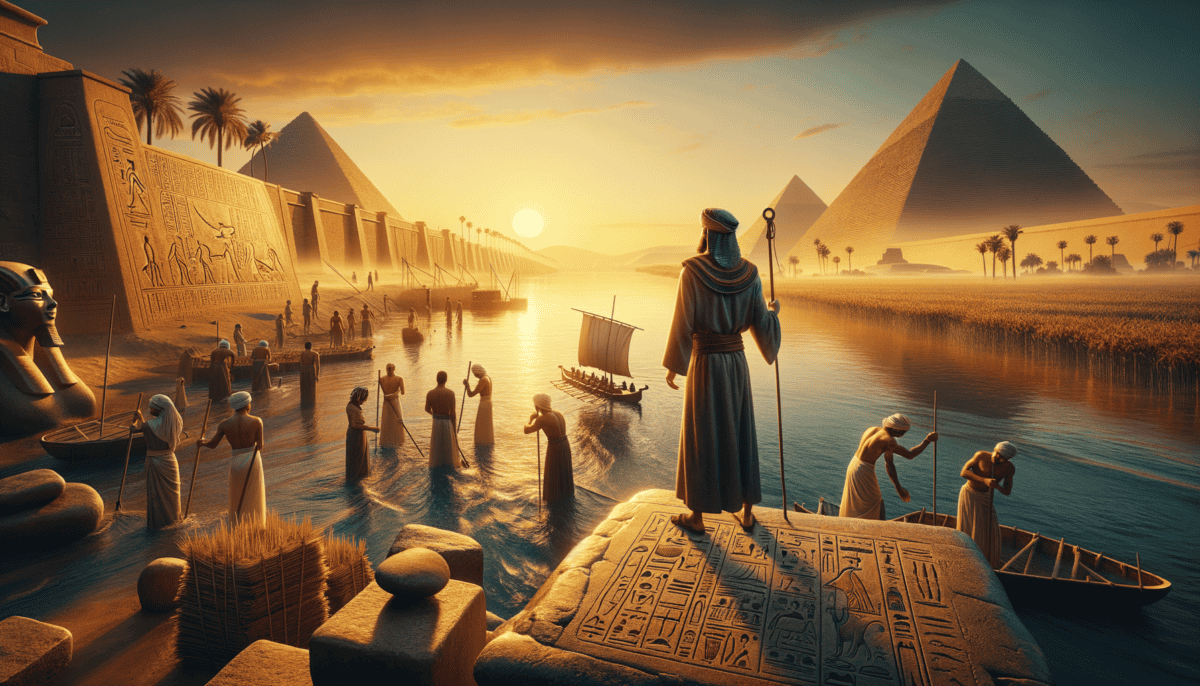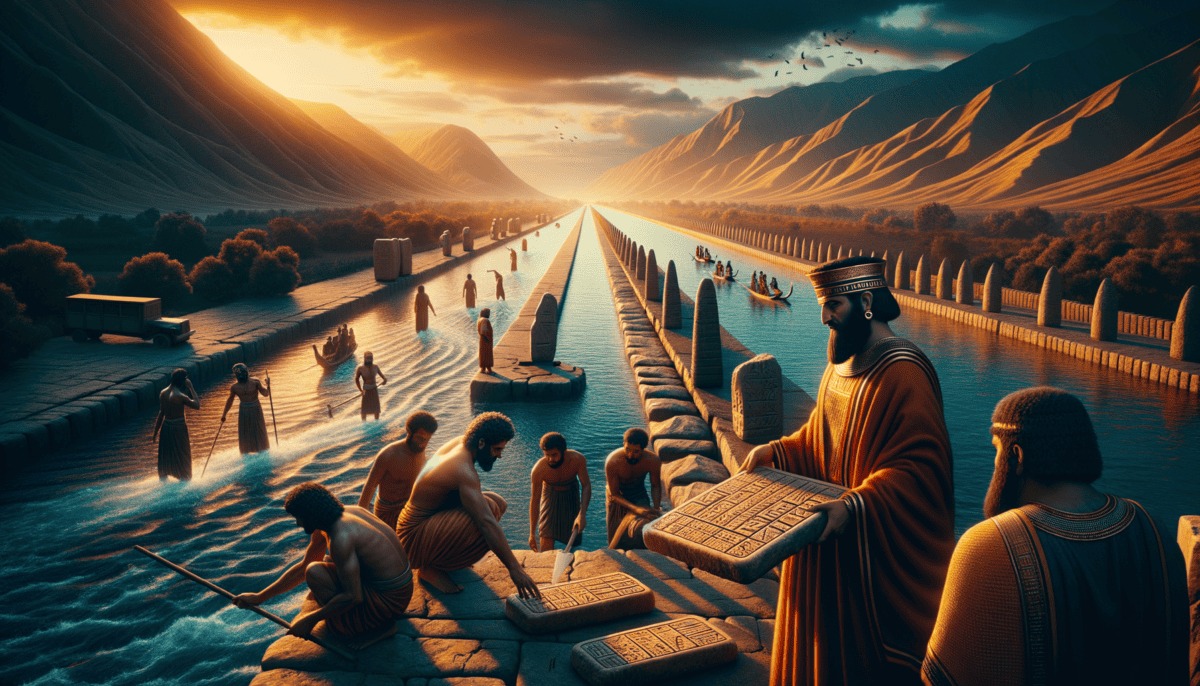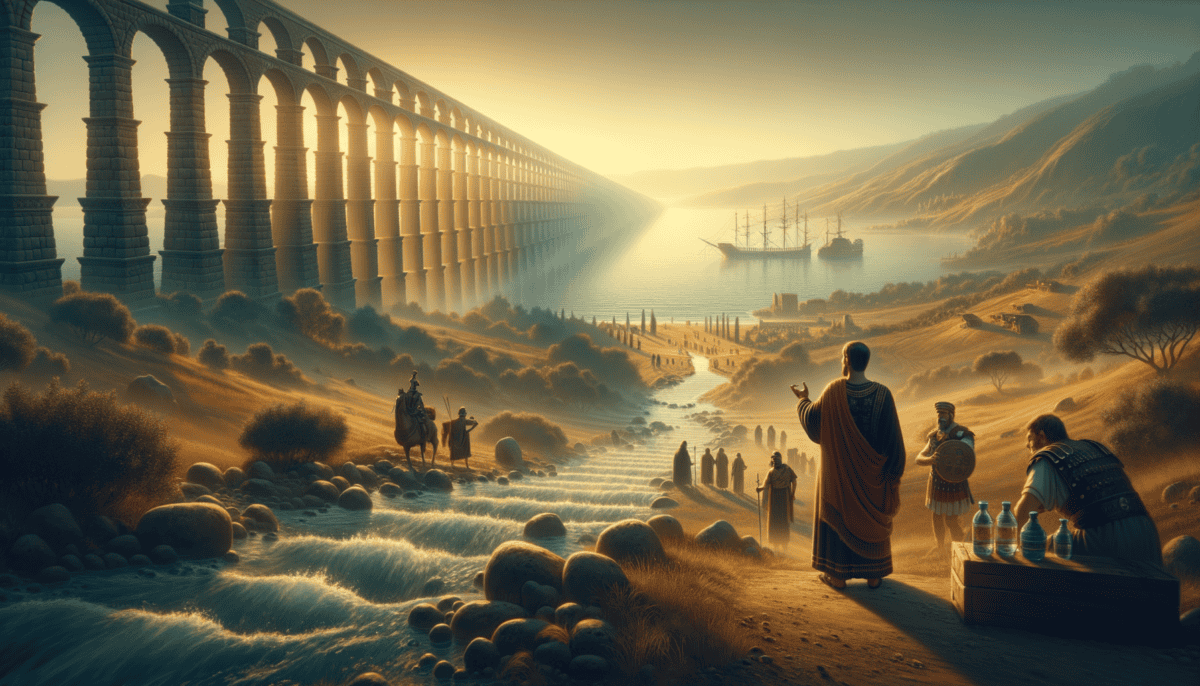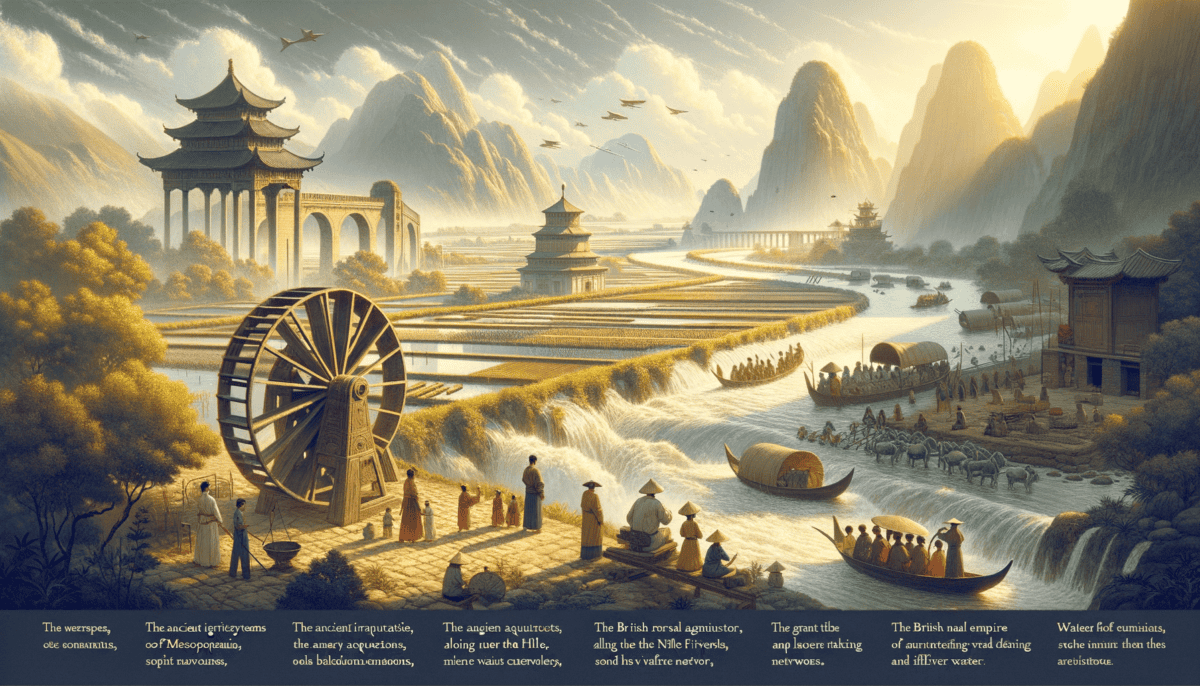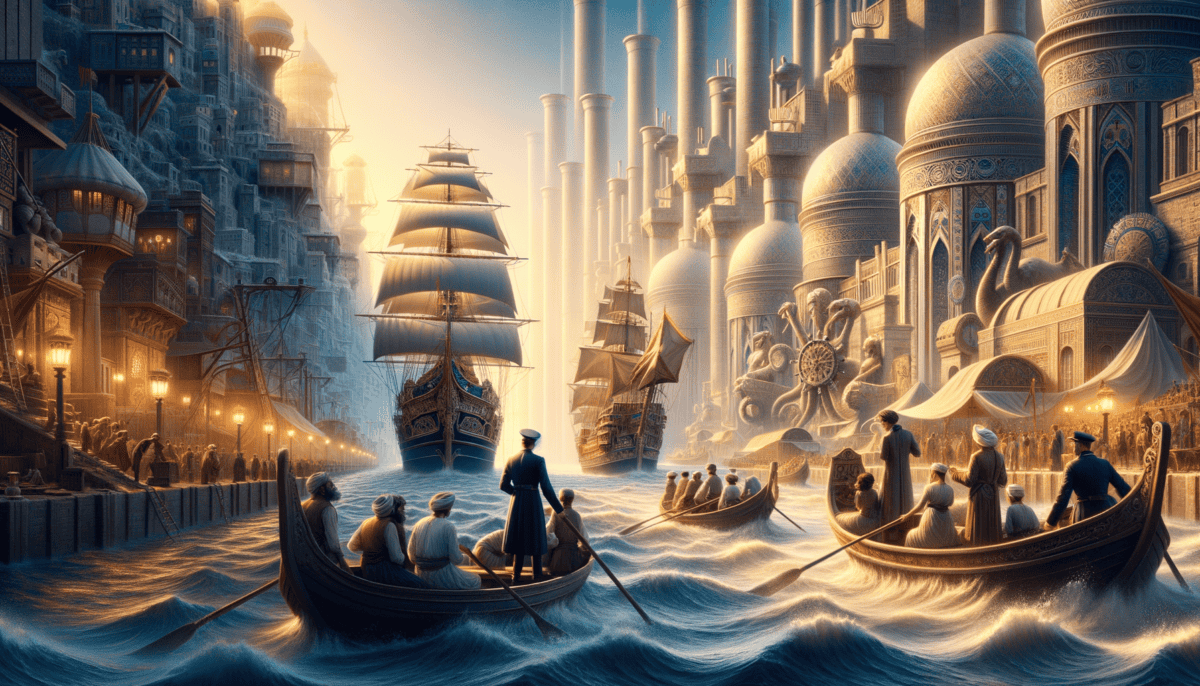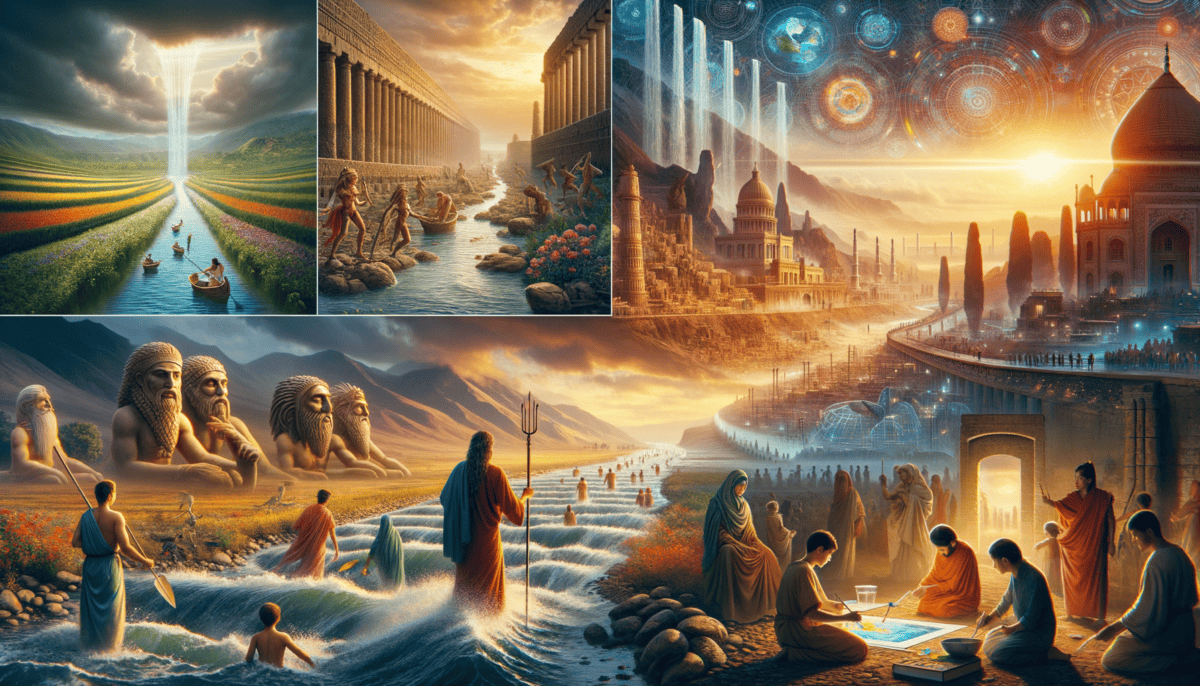The Nile’s Lifeline
The bright sun rose over the sandy hills of ancient Egypt. Young Amenemhat wiped sweat from his forehead as he stood beside the mighty Nile River. The water stretched as far as his eyes could see, like a giant blue snake winding through the desert.
“Father, when will the floods come?” Amenemhat asked, watching a group of ibis birds wade through the shallow waters. His father, Nakht, the royal water engineer, smiled wisely.
“Soon, my son. When the stars of Sirius appear in the night sky, the waters will rise. Just as they have for thousands of years.”
The Gift of the Nile
Every year, like magic, the Nile would flood. But this wasn’t scary flooding – it was good flooding! The river brought rich, dark mud that made the soil perfect for growing food.
“Without the Nile, there would be no Egypt,” Nakht explained. “The river gives us life in the desert.”
Amenemhat watched as farmers prepared their tools. They knew the flood was coming. It was like a big party that happened every year. The whole kingdom waited for this special time.
The River’s Special Helper
Nakht pulled out a special tool called a Nilometer. It looked like stairs going down into the water.
“This helps us measure how high the water will rise,” he explained. “When the water reaches the right step, we know we’ll have a good year for growing food.”
Suddenly, a royal messenger appeared, running toward them. “Master Nakht! The Pharaoh requests your presence! The sacred crocodiles in the temple pool are acting strangely!”
Signs from the Gods
The ancient Egyptians believed the Nile was a gift from their gods. They watched everything about the river carefully. Animals, plants, and even the color of the water could tell them important things.
Here’s what they looked for:
- Crocodile behavior
- Birds flying patterns
- Lotus flowers blooming
- Water color changes
- ⭐ Position of stars
Race Against Time
Nakht grabbed his measuring tools. “Come, Amenemhat. It’s time you learned how we predict the floods.”
As they hurried to the temple, Amenemhat felt excited. He was going to learn the secrets of the Nile! Maybe someday he would be as important as his father.
The temple priests were waiting anxiously. The sacred pool’s crocodiles had moved to higher ground – a sign the floods might come earlier than expected.
Nakht studied the water marks and the sky. He needed to make an important decision. Should he tell the Pharaoh to start the flood preparations early? Or wait for more signs?
Would young Amenemhat help his father make the right choice? The fate of Egypt’s crops – and its people – depended on getting this right!
Rivers Between Two Worlds
In the land between two mighty rivers, young Enlil watched the sunrise over the Tigris River. His father, Zababa, was showing him something amazing – the first irrigation channels their tribe had built.
“Look, my son,” Zababa pointed to the clever water paths they had made. “These channels bring water to our crops, even when we’re far from the river.”
A Clever Way to Move Water
“But father, why can’t we just farm next to the river like before?” Enlil asked, watching the water flow through the dirt channels.
“Because now we can grow food anywhere! We are no longer slaves to the river’s path,” Zababa smiled proudly.
Other tribes were starting to notice their success. More and more people were coming to learn about their water-moving magic.
The First Cities Grow
As more people learned to move water where they wanted it, something new began to happen. Instead of moving around to find water, people started staying in one place.
Big towns grew into the world’s first cities! They had:
- Tall buildings made of mud bricks
- Lots of families living together
- Big fields of crops
- New ways to count and write
- Leaders who made rules
Trouble in Paradise
One morning, Enlil noticed worried looks on the adults’ faces. A messenger had brought news – another tribe was building dams upstream!
“They’re taking too much water,” Zababa frowned. “If they don’t share, our crops will die.”
Making New Friends
Instead of fighting, Zababa had an idea. He invited the other tribe’s leader to visit. “Let me show you something special,” he said.
Zababa showed them how to build better irrigation channels that would help everyone. He explained how sharing the rivers could make both tribes stronger.
Writing it Down
The tribes needed to remember their water-sharing agreement. So they made marks in wet clay tablets – the world’s first writing!
“See these marks?” Zababa showed Enlil. “Now we can remember exactly how much water each tribe should get.”
Growing Together
As the sun set over the Euphrates River, Enlil watched both tribes working together. They were building bigger and better irrigation channels. Their cities were growing larger.
“Father,” Enlil said excitedly, “I want to learn to build water channels too!”
Zababa patted his son’s shoulder. “You will, my boy. And maybe you’ll build something even better than we have now. The rivers have many more secrets to teach us.”
The two mighty rivers had brought people together, teaching them that sharing water made everyone stronger. But more challenges and adventures lay ahead for young Enlil and his people!
Masters of Water and Stone
Marcus wiped sweat from his brow as he looked up at the tall stone arch rising above him. The young Roman engineer was helping build something amazing – an aqueduct! ️
A Big Dream
“Commander Claudius, will it really work?” Marcus asked his mentor, pointing at the huge stone structure.
“It will do more than work, young friend. It will bring life to our city!” Claudius smiled proudly.
The Romans were building these amazing water bridges all across their growing empire. Clean water would flow from mountain springs right into people’s homes!
More Than Just Bridges
Marcus learned that moving water was just the start. The Romans were masters of using water in clever ways:
- ♂️ Public baths to keep people clean
- Underground pipes to carry away dirty water
- ⛲ Beautiful fountains in city squares
- Irrigation systems for farms
- ⚓ Safe harbors for ships
A Watery Challenge
One morning, Marcus noticed something wrong. “Commander, the water level is dropping!” he called out.
Claudius frowned. Someone was blocking their water source in the mountains. This could spell trouble for the whole city!
Smart Solutions
Instead of sending soldiers, Claudius had a better idea. “Let’s show them how we can help each other,” he told Marcus.
They traveled to the mountain village and offered to build them their own water system. Soon, both the village and the city had plenty of clean water!
Building an Empire
As the Romans built more aqueducts, roads, and harbors, their empire grew bigger. Ships could sail safely to far places, bringing back exciting new things.
“Water connects us all,” Claudius explained to Marcus. “It helps us make new friends and learn new things.”
Looking to Tomorrow
Marcus stood proudly beside his finished aqueduct. Water flowed smoothly through the stone channels, bringing life to the city below.
“One day, I’ll build even bigger things,” he said excitedly. “Maybe I’ll help bring water to the whole empire!”
“You will,” Claudius nodded. “Remember, Marcus – whoever controls water, controls the future.”
As the sun set behind the aqueduct, Marcus dreamed of all the amazing things Romans would build next. Their water wisdom was helping create the biggest empire the world had ever seen!
Rivers of the Dragon Empire
Li Wei stood at the edge of the mighty Yangtze River, watching boats glide past like dancing dragons. The young water administrator had an important job – helping keep China’s great rivers flowing smoothly!
Two Great Dragons
“Teacher Zhang, why do we have two big rivers?” Li Wei asked his old master.
“Ah, young one,” Zhang smiled. “The Yellow River in the north and Yangtze in the south are like two dragons watching over our land. They give us life!”
The rivers helped grow rice and other yummy foods. They carried boats full of silk and tea. But sometimes, these dragon rivers could cause big problems!
A Farmer’s Worry
One day, farmer Ming ran to Li Wei with worried news. “The river is rising too high!” he cried. “Our rice fields will flood!”
Li Wei knew they had to act fast. The Chinese people had learned many clever ways to control their powerful rivers:
- Special ditches to water crops
- ⛰️ Strong walls to stop floods
- Deep channels for boats
- Gates to control water flow
- Ponds to save extra water
Working Together
“Don’t worry,” Li Wei told Ming. “We’ll build something special!”
They gathered many people to help build a new way to control the water. Some dug channels, others built walls. Everyone worked as one big team!
The Emperor’s Gift
Word of Li Wei’s clever fix reached the Emperor himself! He was so happy, he made Li Wei his special river helper.
“Our empire grows strong because we understand our rivers,” the Emperor said. “They are a gift from heaven.”
Growing Wisdom
Li Wei learned more each day. He saw how the rivers helped China grow:
Cities got bigger along the riverbanks. Boats carried new ideas up and down the water. Farmers grew lots of food in the rich soil.
Looking Forward
One evening, Li Wei sat with Teacher Zhang, watching the sunset paint the river gold.
“The rivers have taught us so much,” Wei said. “They show us that change is natural, and we must flow with it.”
Zhang nodded wisely. “Yes, and as long as we respect the dragon rivers, they will help our empire stay strong for many years to come.” ✨
Li Wei smiled, knowing he was part of something very special. The great rivers of China weren’t just water – they were the beating heart of their amazing empire!
Kings of the Seven Seas
Captain James Stewart stood proudly at the helm of his mighty ship, the “Ocean Queen.” The wind filled its giant white sails as it cut through the blue waves.
The Captain’s Quest
“Look alive, crew!” Captain Stewart called out. “We’re carrying precious cargo for the British Empire!” His ship was full of tea, spices, and silk from far-away lands.
Little Tommy, the cabin boy, looked up at him with wide eyes. “How did Britain become so powerful on the seas, Captain?”
“Well lad, it’s all about controlling the water routes,” the Captain smiled. “Whoever rules the seas, rules the world!”
Racing the Waves
The British weren’t alone on the seas. Other countries wanted to control the water paths too! Spanish, Dutch, and French ships raced to build their own sea empires. ♂️
Tools of the Trade
Britain became great at sea because they had:
- ⚓ Strong wooden ships
- Smart sailors who could read maps
- Special tools to find their way
- ⛵ The biggest group of ships
- Knowledge of ocean routes
A Storm Brewing
Dark clouds gathered on the horizon. “Storm coming!” shouted the lookout. ️
“Not to worry,” Captain Stewart told Tommy. “British sailors know how to handle any weather. That’s why we rule the waves!”
Trading Tales
At each port, Captain Stewart traded goods with local people. Tea from China, cotton from India, sugar from the Caribbean – British ships carried it all!
“Every port has a story,” he told Tommy. “And every story helps make our empire stronger.”
Guarding the Gates
The Ocean Queen sailed past Gibraltar, a rocky gate between two seas. British soldiers waved from the fortress above.
“We guard important water paths like this one,” explained the Captain. “It helps us keep our ships safe.”
Power of the Seas
As the sun set, Tommy watched dolphins play in the ship’s wake.
“Remember this, lad,” Captain Stewart said softly. “The sea connects all lands. By mastering it, Britain has built something special – an empire where the sun never sets!”
The Ocean Queen sailed on through the night, carrying pieces of empire across the endless blue. The water paths that Britain controlled would help make it the most powerful nation in the world! ⭐
Water’s Future Promise
Dr. Sarah Chen stood at the edge of the mighty Nile River, just like people did thousands of years ago. But today, she held a special tablet computer instead of ancient tools.
A Special Meeting
“Look at this, Maya!” Dr. Chen showed her young daughter the river. “People have lived by this water for over 5,000 years!”
“Wow, Mommy! That’s a really long time,” Maya said. “Do people still need rivers today?”
“More than ever, sweetie. Water helps us grow food, make electricity, and keep our cities running!”
Working Together
Dr. Chen worked with people from many countries to protect water. They met in a big room with flags from all over the world.
“Water connects us all,” she told the group. “We must work together to keep it clean and share it fairly.”
Modern Water Heroes
People around the world help protect water in different ways:
- Planting trees to keep rivers clean
- Building better pipes for cities
- ☔ Saving rain water
- Making ocean water clean to drink
- Using less water at home
Nature’s Warning
Maya pointed to some pictures on her mom’s tablet. “These rivers look sick!”
“You’re right,” Dr. Chen nodded. “Some rivers need our help. But we’re learning from the past to make things better!”
Smart Solutions
Dr. Chen showed Maya a new water cleaning machine. It used the sun’s power to make dirty water clean! ☀️
“This is like magic!” Maya clapped.
“It’s science,” her mom smiled. “And it helps people just like the old aqueducts did!”
Hope Flows Forward
As the sun set over the Nile, Dr. Chen hugged Maya close.
“Remember sweetie, water has always been special. It helped build great empires in the past. Now it’s our turn to protect it for the future!”
That night, Maya dreamed of clean rivers flowing through green valleys, carrying hope to people everywhere. She knew that like the mighty empires before, our world still depends on precious water. But now, we have new tools and wisdom to help us be better guardians of Earth’s most important treasure! ⭐
From the ancient Nile to modern cities, from Roman aqueducts to smart computers, water continues to shape our story. And if we work together, its power will keep helping people for many years to come!

